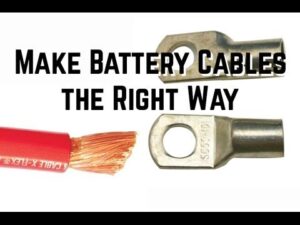Looking to keep your basement dry and protect it from flooding? Wondering how long a 12v battery can power your sump pump? You’re not alone. Many homeowners who experience power outages or live in areas with inconsistent electrical supply find themselves grappling with this question. The good news is that there is a solution. In this article, we will explore exactly how long a 12v battery can run a sump pump, providing you with the information you need to ensure your basement remains flood-free. So, let’s dive right in. How long will a 12v battery run a sump pump? Let’s find out.
How Long Will a 12V Battery Run a Sump Pump?
Sump pumps are essential equipment for homeowners looking to protect their basements or crawl spaces from flooding. These pumps are typically powered by electricity, but what if you experience a power outage during a storm? That’s where a 12V battery comes in handy. In this article, we will explore the topic of how long a 12V battery can effectively run a sump pump, providing you with the information you need to keep your basement dry and protected even when the power goes out.
Understanding Sump Pumps and Power Requirements
Before delving into the specifics of battery runtime, it’s crucial to have a basic understanding of sump pumps and their power requirements. A sump pump is a device that helps remove water from a pit, known as a sump basin, located in the lowest part of a basement or crawlspace. It prevents water accumulation, which can cause structural damage, mold, and other issues.
Most residential sump pumps operate using standard 120V AC power. However, they can also be powered by a 12V DC battery during power outages. The power requirements of a sump pump vary depending on the specific model, pumping capacity, and the height the water needs to be lifted. It’s important to consult the manufacturer’s specifications to determine the power needs of your sump pump.
Factors Affecting Battery Runtime
The length of time a 12V battery can run a sump pump depends on various factors. Understanding these factors will help you manage your expectations and plan accordingly. Here are the key factors that affect battery runtime:
1. Battery Capacity
The capacity of a battery is measured in ampere-hours (Ah) and represents the amount of charge it can store. A higher Ah rating indicates a larger capacity and, consequently, a longer runtime. It’s crucial to choose a battery with sufficient capacity to ensure your sump pump can operate for an extended period during a power outage.
2. Pump Power Consumption
Different sump pumps have varying power consumption rates. It’s important to check the power requirements of your specific sump pump model. Most manufacturers provide this information in the product manual or on their website. Knowing the power consumption will help you calculate how long the battery can power the pump before it drains completely.
3. Battery Efficiency
Not all batteries are equally efficient at converting stored energy into power for the sump pump. Factors such as battery age, technology (e.g., lead-acid, AGM), and maintenance can affect overall efficiency. It’s advisable to choose a high-quality battery known for its efficiency and reliability.
4. Depth and Frequency of Pump Activation
The depth of the water in the sump basin and how frequently the pump activates also impact the battery runtime. If your basement experiences frequent flooding or if the water level rises quickly, the pump will activate more frequently, draining the battery faster. It’s essential to consider these factors when estimating the battery’s runtime.
Estimating Battery Runtime
While it’s challenging to provide an exact duration of how long a 12V battery will run a sump pump, you can estimate it using the following approach:
1. Identify the power consumption of your sump pump in watts. This information can usually be found in the product manual or on the manufacturer’s website.
2. Determine the 12V DC current draw of the sump pump by dividing the power consumption (in watts) by 12.
3. Calculate the battery runtime by dividing the battery capacity (in ampere-hours) by the current draw. This will give you an estimate of the number of hours the battery can power the sump pump.
It’s important to note that this calculation provides an estimate, and actual runtime may vary based on the factors mentioned earlier.
Tips for Extending Battery Runtime
To maximize the runtime of your battery-powered sump pump, consider the following tips:
1. Choose a High-Capacity Battery
Select a battery with a higher ampere-hour (Ah) rating to ensure a longer runtime. This will give you more time in the event of a power outage.
2. Optimize Battery Efficiency
Properly maintain the battery, including regular cleaning and inspections. Keep connections clean and tight to minimize resistance and maximize efficiency.
3. Reduce Sump Pump Cycle Frequency
Reducing the frequency of sump pump activations can significantly extend the battery’s runtime. Consider improving your home’s drainage system or installing additional measures to prevent excess water from reaching the sump basin.
4. Invest in Backup Battery Systems
Consider investing in a backup battery system specifically designed for sump pumps, such as a dual battery system or a battery backup unit. These systems can provide additional runtime and peace of mind during extended power outages.
5. Keep a Spare Battery
Having a spare fully charged battery on hand can provide extra runtime when needed. Rotate the batteries periodically to ensure they remain in good condition.
A 12V battery can provide backup power to a sump pump during a power outage, ensuring your basement remains protected from flooding and water damage. The runtime of the battery depends on various factors such as capacity, power consumption, battery efficiency, and the depth and frequency of pump activation. By understanding these factors and following the tips mentioned, you can estimate and maximize the runtime of your battery-powered sump pump system. Remember to choose a high-quality battery, maintain it properly, and consider investing in backup battery systems for added peace of mind.
Frequently Asked Questions
How long can a 12V battery run a sump pump?
A 12V battery’s runtime for a sump pump depends on various factors, including the capacity of the battery, the power consumption of the pump, and the efficiency of the system. Here are some frequently asked questions about the runtime:
1. What is the capacity of the 12V battery?
The capacity of a 12V battery is typically measured in amp-hours (Ah) and represents the amount of charge it can deliver. The higher the amp-hour rating, the longer the battery can power the sump pump.
2. What is the power consumption of the sump pump?
The power consumption of a sump pump is usually measured in watts (W) and can vary depending on the specific model. It is important to check the pump’s specifications or consult the manufacturer to determine its power consumption.
3. How do I calculate the runtime of the sump pump?
To calculate the runtime, divide the battery’s amp-hour rating by the pump’s power consumption in watts. This will give you the number of hours the battery can run the pump before it is depleted. Keep in mind that this is an estimate, and factors like battery age and efficiency may affect the actual runtime.
4. Can I increase the runtime of the sump pump?
Yes, there are a few ways to increase the runtime of a sump pump. One option is to use a higher capacity battery with a larger amp-hour rating. Another option is to optimize the pump’s power consumption by using energy-efficient models or implementing additional power-saving measures.
5. Are there any backup systems available for extended runtime?
Yes, some sump pump systems offer backup solutions for extended runtime. These backup systems can include additional batteries or alternative power sources like solar panels, which can help maintain power to the sump pump for a longer duration during power outages or emergencies.
Final Thoughts
A 12V battery can run a sump pump for a varying length of time depending on several factors. These factors include the capacity of the battery, the power consumption of the sump pump, and the efficiency of the conversion process. Generally, a 12V battery with a capacity of 100 amp-hours can power a sump pump for around 2-3 hours, while a battery with a capacity of 200 amp-hours can provide power for 4-6 hours. However, it’s important to consider that actual run time will be affected by factors such as pump size, discharge rate, and battery condition. So, when determining how long a 12V battery will run a sump pump, it’s best to consult the product specifications and consider the variables involved.


